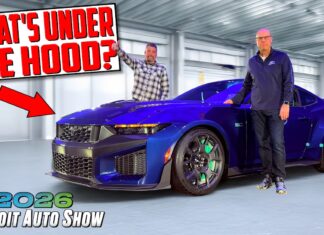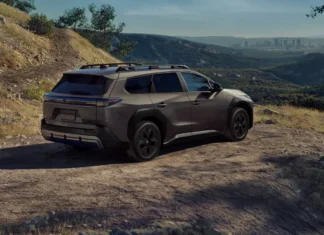
Bringing a vehicle from the drawing board to production is a lengthy and involved process that takes three years and an incredible capital investment. Of course, technology and consumer demands change much quicker, making it difficult to anticipate what consumers will want in their next vehicle purchase.
Predicting what the future will look like in 5, 10 or even 20 years down the road isn’t an exact science. While guessing future events can be somewhat murky because of our rapidly evolving world, insights can be learned by looking at what’s trending. Ford researches five areas for trends are that may lead to how the future is shaping up. Insights learned from observing these micro-trends bring to light Ford’s strategy, product developments, mobile innovations, and customer experiences.

“In our four years of researching and compiling consumer trends, never have we seen optimism, resilience and self-reliance figure so prominently,” said Sheryl Connelly, Ford global trend and futuring manager. “It gives us hope for what the future holds, and we see that same creativity and enterprising spirit driving innovation in every part of our business at Ford.”
We interview Sheryl Connelly, Ford’s in-house futurist and author of the company’s Looking Further with Ford 2016 Trends report. An annual report that goes looks outside the auto industry to help Ford understand what’s happening globally in social, technological, economic, environmental and political arenas.
“The future belongs to those who prepare for it today.”
– Malcolm X
The following ten micro-trends were identified and collectively cover themes of inspiration, ingenuity and a strengthened sense of self-identity.
Embracing Heroes
Consumers are more likely to click and share positive, feel-good stories over sensationalized, negative headlines that fill mainstream media. Studies have shown that 73 percent of adults across the globe are more likely to share positive news stories on social media than negative ones. Now several major news media sites have sections dedicated to uplifting and inspirational stories: Monday Matters on Huffington Post, Uplifting News on Reddit, and Feel-Good-News on the U.K.’s Mirror.

Swiss Army Life
Better living today is not about having more things; it’s about living smarter by pushing to get greater use out of fewer things. There is an increasing demand from consumers to seek out goods that are versatile, durable, and built with quality. Of the adults polled in the U.S., 76 percent are looking to buy a new car and keep it at least 10 years. Makes sense since the average age of a passenger car is 11 years. http://www.kbb.com/car-news/all-the-latest/average-age-of-us-car-and-truck-fleets-hit-record-high-levels/2000007742/
Time Poverty
The average American spends 4.7 hours per day on his/her smartphone and 48 percent of U.S. adults say that staying on top of social media is starting to feel like a full time job. 85 percent of U.S. adults agree that the expected response time for electronic communications is getting shorter and shorter. Work is also getting increasingly demanding – 50 percent of U.S. adults under the age of 35 feel compelled to check their work email during their off hours. Now we have “text neck” – a condition that occurs from hunching over one’s smartphone too long – has been added to the long list of medical problems bearing down on our connected society. Experts say this poor posture can reduce lung capacity by as much 30 percent if left untreated long-term.

The EZ Life, Brought to You by the Connected Concierge
Ford sees the rise of “full-service” technology, as products shift to become more anticipatory and self-sufficient. With the growing support of artificial intelligence, they can redirect responsibilities to technology that learn and adapt to our needs – expanding our sense of hope and possibilities for a better life ahead. Examples already in play are the Apple Watch, Fit Bit or any type of wearable, connected electronics.
Why this trend matters to Ford – Humanity and technology intersect in many different ways. If the Dearborn mobility company can find meaningful ways to use advanced technology to better assist drivers, and society as a whole. Ongoing development in artificial intelligence to learn and anticipate consumer needs is aimed at giving people more time and energy to focus on things that matter most.
Mindful Goes Mainstream
Mindfulness is stress reduction technique, more commonly known as meditation and used by Buddhist monks for centuries. Lately it has grown in popularity and has made its way into homes, schools and the corporate life. Studies show that the practice of mindfulness can reduce the impact of stress that comes with complicated and demanding lifestyles. The solution is to be less mind full and more mindful – thereby allowing us to the find the time and space to breathe, reflect and regroup.

The positive effects of mindfulness are important to Ford when it comes to designing a vehicle’s interior. Getting from point A to B is okay, but self-expression and escapism are ultimately important aspects to consumers when shopping for a vehicle. The interior layout, design and human comfort features of a car or crossover are given serious consideration. Consumers want connected mobility in their cars, but customizable comfort must also be part of the package.
In Awe of Aging
Life expectancy is getting higher and higher as our overall quality of life improves. For seniors who have already passed the century mark, it is not uncommon to be healthy, active and still have a sharp mind. Improvements in health care, nutrition and medical science are pushing today’s seniors to be healthy, meaningful and dignified during those golden years. Thus, our expectations are changing as the reality of being around a lot longer becomes more than just a dream. Some believe that living past the age of 120 is a reality today and the first person to reach the age of 150 has already been born.
Why this trend matters to Ford – In a world where mobility is a human right, aging should not be a handicap. The freedom and autonomy that comes from owning and operating your own vehicle can directly impact the quality of life for aging consumers. Ford engineers are designing ways to make it easier for this growing population to stay mobile and active.

Fit for Misfits
Expressing one’s individual style is becoming more popular. Today people are more tolerant of ideas that go against the status quo. As a result, connections between mainstream brands and consumers are falling by the wayside as people seek unique, more personalized and meaningful ties.
Why this trend matters to Ford – the company recognizes today’s marketplace is not a one-size fits all community. Personalization and customization will be offered in new ways and across new platforms – even virtual ones.
Waste Not, Want Not
Globally, 90 percent of adults agree society has an obligation to reuse materials and reduce the amount of trash going to the landfills. In a high-consumption society, innovators are getting creative with extracting value from stuff nobody wants. This sustainability trend promises to push the boundaries of people’s imagination and resourcefulness.
What Ford is doing – in Dearborn and at their Research and Innovation Lab in Palo Alto, California, Ford has been researching for years seeking innovative and scalable ideas to transform renewable resources and recycle waste material into products that have a strong degree of durability and reasonable manufacturing cost. Soy-based polyurethane foam is used in every vehicle built in North America, which reduces petroleum production by more than 5 million pounds and carbon dioxide emissions by more than 20 million pounds annually. Ford is the only automaker to use REPREVE – a recycled fiber made from plastic bottles. By using this material, more than 11 million plastic bottles were diverted away from the landfills in 2015 alone. Another example is the collaboration between Ford and H.J. Heinz Company exploring the use of tomato fiber to develop a more sustainable bio-plastic material for use in wiring brackets and storage bins. The researchers are looking for ways to recycle and repurpose peels, stems and seeds from more than 2 million tons of tomatoes, which Heinz normally sends out for composting, into strong, lightweight car components.

Buying Into the Flexible Economy
The workplace is rapidly changing and seeing a rise of freelance models and sharing economy platforms. Business models are adapting to maximize resourcefulness while allowing for greater flexibility and fulfillment. This carries over to workers who are finding new ways to make their investments supply additional revenue from goods that were sometimes idle, such as cars, homes and tools. The rise in popularity of sharing programs, such as AirBnB, Uber and ZipCar, are examples of this growing dynamic.
Why this trend matters to Ford – As work dynamics change, so do expectations of mobility. A growing freelance and remote workforce requires rethinking conventional commitments, learning to cater to a rising demand for more independence and multimodal modes of transportation and ownership.
Retail Revolution
Retail is no longer simply about product, it’s about experience. 48 percent of U.S. consumers say they will buy more from a retailer who personalizes their shopping experience. Thus, retailers are finding new ways to inspire meaningful connections with consumers.
Why this trend matters to Ford – As consumer retail behaviors and expectations rapidly evolve, Ford is rethinking its own consumer experience – both an automotive company and a mobility company. On the automotive side, Ford is looking at new ways to simplify and streamline the shopping experience for car buyers through the use of beacon technology. Beacons are low-energy, Bluetooth enabled sensors fitted to vehicles that push educational pop-up notifications to smartphones of consumers who have opted-in to a dealer’s Wi-Fi network and downloaded a Ford shopping app. Experiments with multimodal transportation and an on-demand Dynamic Shuttle service pilot program are two ideas in action that will contribute data and findings to Ford’s future mobility endeavors.
























